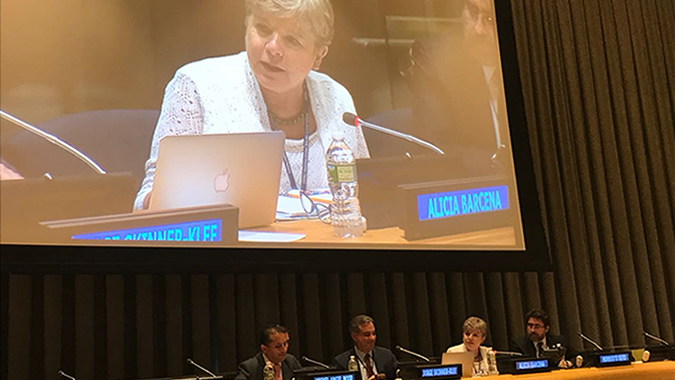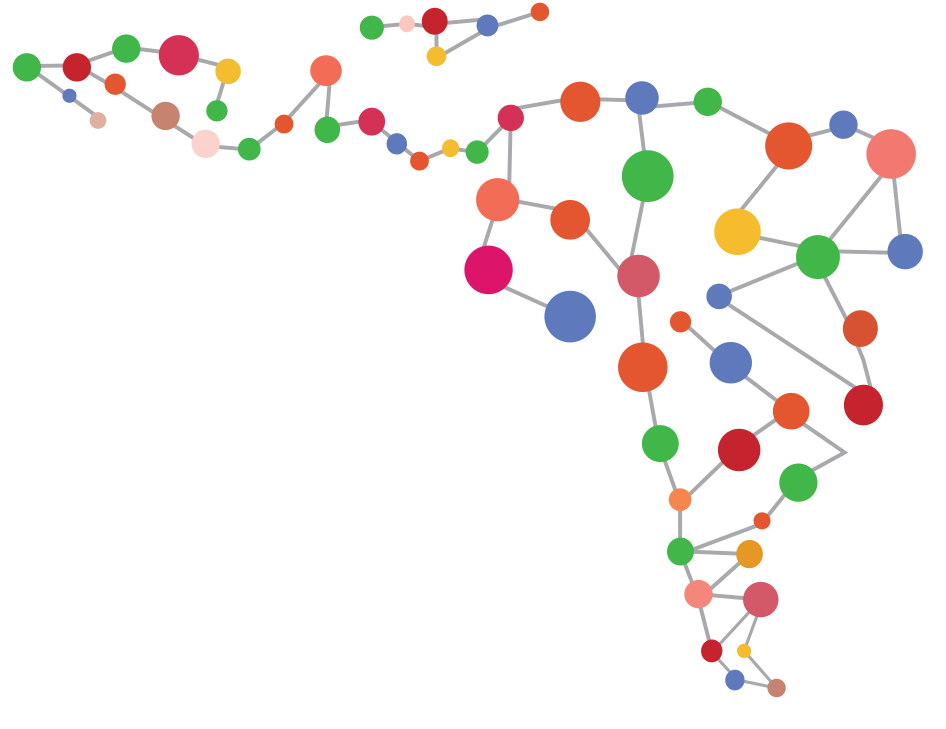Alicia Bárcena: Planning is Key to Implementation of the 2030 Agenda in Latin America and the Caribbean
Work area(s)
ECLAC’s Executive Secretary participated today in a side event to the High-level Political Forum on Sustainable Development, which is being held at United Nations headquarters in New York.

The new development paradigm proposed by the 2030 Agenda positions and reappraises planning as a means of implementation and demands a long-term vision, with coherent policies linked to budget periods, with the availability of timely and quality data and statistical information, and with transparent and participatory systems for monitoring, accountability and evaluation, Alicia Bárcena, the Executive Secretary of the Economic Commission for Latin America and the Caribbean (ECLAC), said today.
The senior United Nations official participated in the event Policy Coherence: From the Global to the National and Local Levels, organized by ECLAC and the government of Guatemala and held on the sidelines of the High-level Political Forum on Sustainable Development, which is taking place through July 18 at the United Nations’ headquarters in New York.
The other participants in the event were Miguel Ángel Moir, Secretary of Planning and Programming at Guatemala’s Office of the President; Ambassador Jorge Skinner-Klée, Guatemala’s Permanent Representative to the United Nations; and Humberto Soto, Social Affairs Officer from ECLAC’s subregional headquarters in Mexico.
“The 2030 Agenda calls on us to change our fragmented and isolated institutional culture in order to act in a coordinated, articulated and inclusive way, with multi-sectoral approaches and by identifying the interconnections and critical links between the economic, social and environmental dimensions of sustainable development. Long-term planning allows for producing State policy and building the continuity of development models with greater equality and sustainability at a national and territorial level,” Alicia Bárcena said during her remarks.
She noted that public policy is effective when it is territorialized and has budgetary backing, adding that planning guarantees coherence among public policies.
She also stated that long-term planning requires quality and disaggregated information, data and statistics as the basis for making decisions, which means it is imperative that national and regional statistical institutions be strengthened. In that sense, she called for bolstering the Statistical Conference of the Americas (SCA) as a regional platform for data and statistics related to sustainable development.
ECLAC’s top representative noted that, to date, only on 5 of the 17 Sustainable Development Goals (SDGs) is there a chance of reaching 50% of their indicators. These include SDG 1, on ending poverty; 3, which refers to health and well-being; goal 5, on gender equality; 7, which calls for guaranteeing access to affordable and clean energy; and SDG 8, which addresses decent work and economic growth.
“On the rest of the SDGs, an effort must be made to improve information to be able to produce the indicators. This entails strengthening national statistical institutes,” she affirmed.
Alicia Bárcena recalled that today 20 of the 33 countries in Latin America and the Caribbean have national coordination mechanisms for the implementation and follow-up of the 2030 Agenda on a national level.
She added that more than 50% of the technical secretariats of these mechanisms are planning bodies, and they have the great challenge of coordinating sectors, bringing together actors, defining the strategies and alliances needed to achieve the SDGs, and preparing for accountability processes.
“The 2030 Agenda and the SDGs do not involve goals that are different from those prioritized by States, but they do entail a different way of addressing them, and that is why it is important to seek the virtuous circles between the different targets and goals,” she stated.
In the framework of the side event, ECLAC presented a methodology for identifying the critical links and nodes between the 2030 Agenda and planning.
“ECLAC’s methodology allows for aligning national priorities with global ones,” Alicia Bárcena explained.
The tool seeks to articulate the contents of a planning instrument in terms of strategies and lines of action, with the goals and targets of the 2030 Agenda. It also aims to identify the links between these targets and strategies in order to subsequently carry out a process of prioritization through the identification of critical links and nodes, which ultimately develops into propositions for national priorities regarding the process of implementing actions toward achieving the SDGs.
ECLAC’s most senior representative also highlighted the importance of the Regional Council for Planning, the intergovernmental subsidiary body that orients the activities of ECLAC’s Latin American and Caribbean Institute for Economic and Social Planning (ILPES). In addition, she pointed to the relevance of the Regional Observatory on Planning, a space for analysis, information and the collective construction of knowledge for governments, academia, the private sector and civil society, with regard to planning for development in Latin America and the Caribbean.
Finally, Alicia Bárcena reiterated the key role played by the Forum of the Countries of Latin America and the Caribbean on Sustainable Development, an annual meeting organized under ECLAC’s auspices, which constitutes a multi-actor platform for fostering dialogue among peers, learning and the exchanging of experiences at a national and territorial level regarding implementation and follow-up of the 2030 Agenda for Sustainable Development.
In addition, she highlighted the Forum’s successful second meeting, which was held in April 2018 at ECLAC’s central headquarters in Santiago, Chile, and where ECLAC presented the Second annual report on regional progress and challenges in relation to the 2030 Agenda for Sustainable Development in Latin America and the Caribbean.
This Forum will hold its third annual meeting on April 22-26, 2019 at ECLAC’s headquarters in Santiago, Chile.
Type
Country(ies)
- Latin America and the Caribbean

